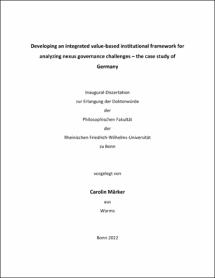Märker, Carolin: Developing an integrated value-based institutional framework for analyzing nexus governance challenges : the case study of Germany. - Bonn, 2022. - Dissertation, Rheinische Friedrich-Wilhelms-Universität Bonn.
Online-Ausgabe in bonndoc: https://nbn-resolving.org/urn:nbn:de:hbz:5-66073
Online-Ausgabe in bonndoc: https://nbn-resolving.org/urn:nbn:de:hbz:5-66073
@phdthesis{handle:20.500.11811/9719,
urn: https://nbn-resolving.org/urn:nbn:de:hbz:5-66073,
author = {{Carolin Märker}},
title = {Developing an integrated value-based institutional framework for analyzing nexus governance challenges : the case study of Germany},
school = {Rheinische Friedrich-Wilhelms-Universität Bonn},
year = 2022,
month = apr,
note = {Global megatrends, such as the impacts of climate change and global population growth, require an integrated and comprehensive management of natural resources that accounts for the various interrelations that exist between them. The food-energy-water nexus focuses on these interrelations. The main contribution of this thesis, firstly, is to operationalize the nexus concept for political analyses in order to adequately analyze policy integration between agricultural, water and energy policy. Secondly, the new developed analytical framework is applied to the case study of Germany.
The Institutional Analysis and Development Framework serves as the basic methodological framework. It focuses on central institutions, involved actors as well as further determining factors. The basic framework is extended in two ways. Firstly, a value dimension is added, which allows to identify underlying values and associated value conflicts in the respective policy fields. Secondly, the value-based framework is extended by the concept of Environmental Policy Integration. This allows for the development of two novel analytical frameworks that capture the different levels of vertical and horizontal policy integration related to the food-energy-water nexus.
In the second part of the thesis, the newly developed methodological framework is applied to the case study of Germany. The analysis identifies seven different key challenges related to nexus governance, each affecting different linkages between policy fields. Overarching challenges that include all policy fields simultaneously are establishing sustainable development as a guiding policy principle, climate protection and biodiversity conservation. Challenges that affect linkages between selected policy fields are: water pollution from agriculture, sustainable production of bioenergy, energy consumption in agriculture, and energy consumption from wastewater treatment plants. The analysis also shows that the challenges are strongly interrelated and that they need to be addressed at different policy levels. Eventually, eight key policy recommendations are derived from these findings.},
url = {https://hdl.handle.net/20.500.11811/9719}
}
urn: https://nbn-resolving.org/urn:nbn:de:hbz:5-66073,
author = {{Carolin Märker}},
title = {Developing an integrated value-based institutional framework for analyzing nexus governance challenges : the case study of Germany},
school = {Rheinische Friedrich-Wilhelms-Universität Bonn},
year = 2022,
month = apr,
note = {Global megatrends, such as the impacts of climate change and global population growth, require an integrated and comprehensive management of natural resources that accounts for the various interrelations that exist between them. The food-energy-water nexus focuses on these interrelations. The main contribution of this thesis, firstly, is to operationalize the nexus concept for political analyses in order to adequately analyze policy integration between agricultural, water and energy policy. Secondly, the new developed analytical framework is applied to the case study of Germany.
The Institutional Analysis and Development Framework serves as the basic methodological framework. It focuses on central institutions, involved actors as well as further determining factors. The basic framework is extended in two ways. Firstly, a value dimension is added, which allows to identify underlying values and associated value conflicts in the respective policy fields. Secondly, the value-based framework is extended by the concept of Environmental Policy Integration. This allows for the development of two novel analytical frameworks that capture the different levels of vertical and horizontal policy integration related to the food-energy-water nexus.
In the second part of the thesis, the newly developed methodological framework is applied to the case study of Germany. The analysis identifies seven different key challenges related to nexus governance, each affecting different linkages between policy fields. Overarching challenges that include all policy fields simultaneously are establishing sustainable development as a guiding policy principle, climate protection and biodiversity conservation. Challenges that affect linkages between selected policy fields are: water pollution from agriculture, sustainable production of bioenergy, energy consumption in agriculture, and energy consumption from wastewater treatment plants. The analysis also shows that the challenges are strongly interrelated and that they need to be addressed at different policy levels. Eventually, eight key policy recommendations are derived from these findings.},
url = {https://hdl.handle.net/20.500.11811/9719}
}






